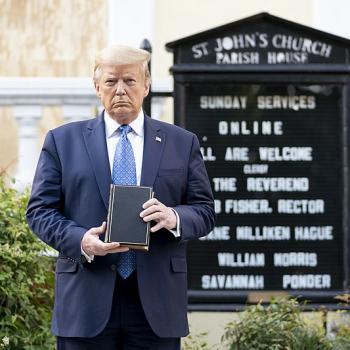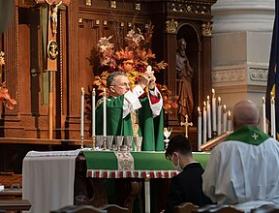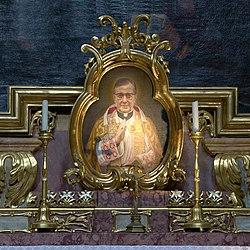His name is Dominic Gondreau. He is eight years old and he has cerebral palsy.
His father, Professor Paul Gondreau, is living in Rome with his wife and five children while he studies theology. Dominic was allowed to sit up front in the seating for disabled people. His mother was with him, but since there were only two seats available, Dominic’s father stayed back in the crowd with Dominic’s brothers and sisters.
Dominic’s father has written an essay about the event. You can also see an interview with Dominic’s dad, here.
The essay by Dominic’s father from Catholic Moral Theology:
“Small acts with great love,” Mother Teresa was fond of saying. Yesterday, Pope Francis bestowed an extraordinary Easter blessing upon my family when he performed such an act in embracing my son, Dominic, who has cerebral palsy. The embrace occurred when the Pope spied my son while touring the Square, packed with a quarter million pilgrims, in the “pope mobile” after Mass. This tender moment, an encounter of a modern Francis with a modern Dominic (as most know, tradition holds that St. Francis and St. Dominic enjoyed an historic encounter), moved not only my family (we were all moved to tears), not only those in the immediate vicinity (many of whom were also brought to tears by it), not only by thousands who were watching on the big screens in the Square, but by the entire world. Images of this embrace quickly went viral, and by Easter Sunday afternoon it was the lead picture on the Drudge Report, with the caption, “Change Hatred into Love” (a paraphrase of Pope Francis’ Urbi et Orbi message that followed shortly thereafter), where it remains even as I write this. Fox News, NBC Nightly News, ABC Nightly News, and CNN all showed clips of it. Lead pictures of it were found in Le Figaro, the New York Post, The Wall Street Journal, the Philadelphia Inquirer, inter alia.
It is often difficult to try to express to people who do not have special needs children what kind of untold sacrifices are demanded of us each and every day. And as for Dominic, he has already shared in Christ’s Cross more than I have throughout my entire life multiplied a thousand times over. What is the purpose in all this, I ask? Furthermore, I often tend to see my relationship with Dominic in a one-sided manner. Yes, he suffers more than me, but it’s constantly ME who must help HIM. Which is how our culture often looks upon the disabled: as weak, needy individuals who depend so much upon others, and who contribute little, if anything, to those around them.
Pope Francis’ embrace of my son yesterday turns this logic completely on its head and, in its own small yet powerful way, shows once again how the wisdom of the Cross confounds human wisdom. Why is the whole world so moved by images of this embrace? A woman in the Square, moved to tears by the embrace, perhaps answered it best when she to my wife afterward, “You know, your son is here to show people how to love.” To show people how to love. This remark hit my wife as a gentle heaven-sent confirmation of what she has long suspected: that Dominic’s special vocation in the world is to move people to love, to show people how to love. We human beings are made to love, and we depend upon examples to show us how to do this.
But how can a disabled person show us how to love in a way that only a disabled person can? Because the Cross of Christ is sweet and is of a higher order. (Read the rest here.)












